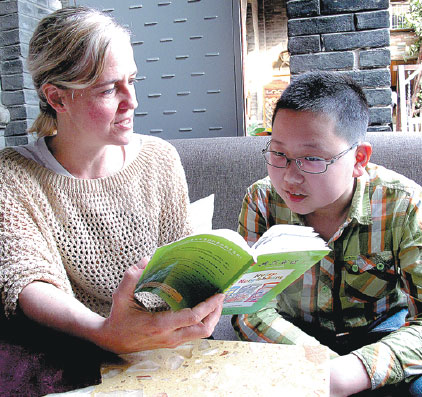Number of foreigners studying is increasing; countries in South Asia account for 28 percent
It is not uncommon for Chinese to forget Chinese characters when they write, as they are used to typing characters on a computer screen.
 |
|
Sophia Kidd of Los Angeles, California, who studies at Sichuan University, teaches English to a Chinese youngster. Provided to China Daily |
Sophia Kidd, 41, of Los Angeles, California, has studied classical Chinese literature at Sichuan University for five and a half years. She got her master's degree in 2012 and is studying Jin Dynasty (AD265420) literature for her doctorate.
Asked if she finds reading ancient Chinese books boring, Kidd said it is fun. "I loved China as a child."
Kidd's father is a gardener and likes Chinese gardens, she said. Influenced by her father, she has shown a keen interest in China.
Her teachers do not lower the requirements for her because she is not Chinese.
"The teachers evaluate us with the same standards. To meet their requirements, I have to study very hard and have had no vacations," she said in fluent Chinese.
Two years ago, she became ill as a result of overwork. So her graduation from the doctor's degree program will be postponed for six months.
Kidd is one of more than 2,000 overseas students at Sichuan University. A key Chinese university, Sichuan has witnessed a rise in the number of overseas students.
"Their number rose from 1,445 in 2010 to 2,307 in 2014. The students are from more countries. In 2010, they were from 70 countries. In 2014, they were from 94 countries," said Luo Xun, an official with the university's international exchange division.
Overseas students from the seven countries in South Asia have been a leading component of all the overseas students at Sichuan.
In 2014, the university had 654 students from Pakistan, Bhutan, Maldives, Bangladesh, Nepal, Sri Lanka and India, which accounted for 28 percent of all the overseas students at the university.
There were only 450 students from those seven countries in 2010.
Zeng Xiangyu, a deputy research fellow with the Institute of South Asian Studies at the university, attributed the popularity of the university among South Asian students to Sichuan's relatively short distance from their countries.
"Because Sichuan is near, the university is their first choice. Some fields in the university are strong and can meet their needs," he said.
The university has advantages in fields such as medicine, water conservancy, hydro power, economy and business management, to name only a few.
"Take medicine for example. Sichuan University is very strong in the teaching of medicine. South Asian countries lack doctors and doctors there have high income and social status," he said.
Zeng once met somebody in a South Asian country whose family totals 43 people. He majored in human resources while all the rest had studied medicine.
He told Zeng that he had difficulty in mingling with the family members because of his major.
"The cost of studying medicine at Sichuan University is relatively lower than in Europe and America. As a matter of fact, the cost of studying medicine in South Asian countries is high. For these reasons, South Asian students find Sichuan University can meet their needs," Zeng said.
His university has long stressed studies of South Asian countries. In 1964, the Institute of South Asian Studies was founded.
"It is one of the most important bases for studying South Asia. Some of the scholars at the institute are internationally renowned in the studies of South Asia," said Sun Shihai, president of the Chinese Association for South Asian Studies.
Contact the writers at huangzhiling@chinadaily.com.cn and pengchao@chinadaily.com.cn
